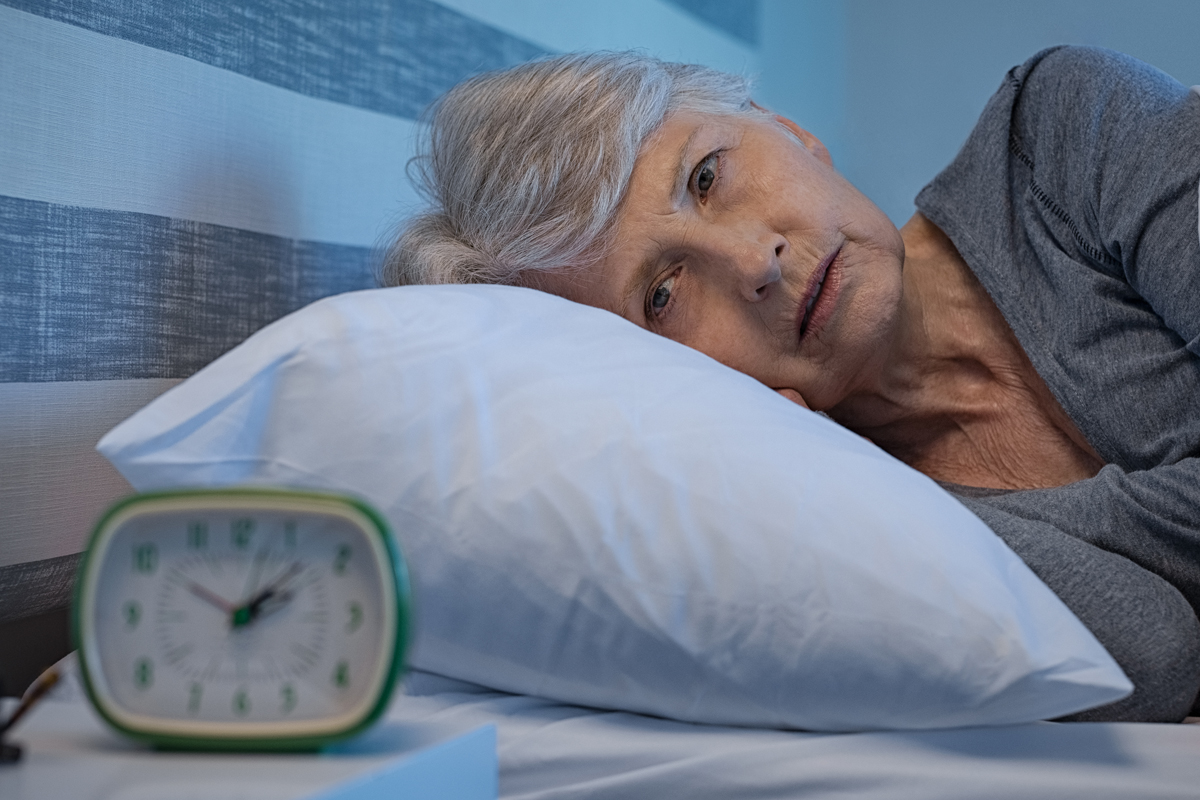“I wake up feeling exhausted even after a full night’s sleep, my night sweats are affecting my sleep and intimacy. My mood swings, when I can recognize them, are unpredictable. The hot flashes make it difficult to concentrate at work, leaving me feeling embarrassed and that I am constantly on edge. I can’t focus on anything, and my memory feels like it’s slipping. It’s affecting my confidence and self-esteem, and I feel like I’m not performing at my best. It’s also impacting my relationships at home as I’m often irritable and short-tempered. I just want to feel like myself again and enjoy life without these constant symptoms.”
Listen to this blog on Spotify, here…
Understanding Menopause
Menopause is a natural biological process that marks the end of a woman’s reproductive years. It occurs when a woman’s ovaries stop producing eggs, and her menstrual periods stop.
Menopause typically occurs between the ages of 45 and 55, with the average age of onset being 51. However, it can occur earlier or later, and certain factors such as genetics, smoking, and certain medical treatments for example breast cancer, ovarian or endometrial cancers, and a complete hysterectomy may affect the timing. Menopause is a normal and natural part of aging, and while it can bring some challenges, many women find ways to manage their symptoms and embrace this new phase of life.
Full Body Effects of Menopause
Menopause can affect women physically by causing hot flashes, night sweats, vaginal dryness, weight gain and changes in bone density. Emotionally, menopause can lead to mood swings, anxiety, and depression. Mentally, menopause can impact cognitive function, including memory and concentration. Additionally, menopause can also affect a woman’s sex drive and overall quality of life. It’s important to note that not all women will experience the same symptoms, and the severity of symptoms can vary.
Common Symptoms of Menopause
Hot flashes and night sweats
Hot flashes and night sweats are common symptoms experienced by women during menopause. The exact cause of these symptoms is not fully understood, but they are believed to be related to the hormonal changes that occur during this time. Specifically, the decrease in estrogen levels in the body can affect the hypothalamus, which is the part of the brain that regulates body temperature. This can cause the hypothalamus to become more sensitive to small changes in temperature, resulting in hot flashes and night sweats. Additionally, the decrease in estrogen can also affect the body’s production of serotonin, which can contribute to these symptoms.
Another consideration is pregnenolone, known as the mother of all hormones. Pregnenolone levels can decline during menopause in conjunction with other hormone levels such as estrogen and progesterone. Pregnenolone is a precursor hormone, primarily synthesized in the adrenal glands, as well as in the liver, skin, brain, and sex glands and it is necessary for the production of estrogen, progesterone, and other hormones. Therefore, a decrease in pregnenolone can lead to a decrease in the production of these hormones, which can contribute to menopausal symptoms such as hot flashes, mood swings, and dryness of sensitive tissues, such as vaginal dryness.
Mood swings and irritability
Mood swings and irritability during menopause are primarily attributed to changes in estrogen and progesterone levels. As menopause approaches, estrogen levels start to fluctuate, and eventually, they decrease significantly. These hormonal changes can affect the levels of neurotransmitters, such as serotonin and dopamine, which are associated with mood regulation.
Additionally, progesterone plays a role in maintaining a stable mood, and a decline in progesterone levels during menopause may also contribute to mood swings and irritability.
Another consideration is that with a decrease in serotonin and especially dopamine during menopause mood swings and irritability can lead to carb and sugar cravings. This is a connection that we have to make as to why menopausal weight gain and the need for emotional comfort during midlife can be complicated.
The decrease in dopamine levels during menopause can lead to an increased desire to eat carbohydrates, sweets, and sugar. Dopamine is a neurotransmitter that plays a role in regulating reward and pleasure centers in the brain. When dopamine levels are low, the brain may seek out other ways to stimulate these centers, such as through food. Carbohydrates, sweets, and sugar can provide a temporary increase in dopamine levels, leading to a temporary feeling of pleasure and reward. However, this can lead to a cycle of craving and overeating these foods, which can contribute to weight gain and other health issues.
Sleep disturbances
Several hormone and neurotransmitter imbalances during menopause can affect sleep quality and cause sleep disturbances. The decrease in estrogen levels can lead to hot flashes and night sweats, which can disrupt sleep. The decrease in progesterone can also cause sleep disturbances, as it is a natural sedative and promotes sleep. Additionally, the decrease in serotonin and melatonin levels can affect sleep, as they play a role in regulating the sleep-wake cycle. The decrease in GABA levels, which is a neurotransmitter that promotes relaxation and sleep, can also contribute to sleep disturbances during menopause.

Fatigue
We know now that hormones and neurotransmitters are precariously intertwined but at no other time is this more apparent than during fatigue experienced by women during menopause as hormones and neurotransmitter levels start to diminish and unravel.
First, a menopausal woman will experience a decrease in estrogen levels which causes fatigue, lethargy, and decreased motivation. Estrogen plays a crucial role in regulating energy production and maintaining healthy mitochondria, which are responsible for producing ATP (adenosine triphosphate) – the body’s primary energy source.
Secondly, a decline in progesterone levels can lead to sleep disturbances, which can result in feeling tired during the day.
Lastly, a decrease in neurotransmitters such as dopamine and serotonin can also impact energy levels, as they play a role in regulating mood, motivation, and energy production.

Changes in weight and body shape
Menopause and imbalances in hormones and neurotransmitters can contribute to changes in weight and body shape in several ways:
- Hormonal changes: During menopause, levels of estrogen and progesterone decrease, which can cause a decrease in muscle mass and an increase in body fat. This can lead to changes in body shape, such as an increase in belly fat.
- Cortisol: Imbalances in cortisol, a hormone released in response to stress, can cause weight gain, especially in the belly area.
- Insulin: Imbalances in insulin, a hormone that regulates blood sugar levels, can also contribute to weight gain and changes in body shape.
- Serotonin: Imbalances in serotonin, a neurotransmitter that affects mood and appetite, can lead to an increase in cravings for carbohydrates and sweets, which can contribute to weight gain.
- Sleep: Imbalances in hormones and neurotransmitters that affect sleep can also contribute to weight gain, as poor sleep has been linked to an increase in appetite and cravings for high-calorie foods.
Overall, menopause and imbalances in hormones and neurotransmitters can have a significant impact on a woman’s weight and body shape.
It is important to address these imbalances through a combination of lifestyle changes, testing and balancing hormones, and supplementation to help maintain a healthy weight and body composition.
It’s important to reiterate that menopause is affecting a woman not only physically but emotionally and cognitively as well and she is often left feeling overwhelmed, embarrassed, and defeated by the changes she is experiencing. She may feel alone and isolated in her personal journey because it is such a taboo subject that most people don’t want to talk about it. Or it can become a point of conflict in a marriage, let’s say a sore spot of intimacy in a relationship.
I’ll talk more about this in my Hormone Harmony webinar next week and we’ll really delve deeper into the effects of menopause on emotions and intimacy in my 6-week course which will include hormone testing. I’m calling it, Women’s Hormone Harmony Clinic, starting in May.
It is important to me that women can feel comfortable talking about menopause and its effects on their lives, so they know they’re not alone. And this may not be a comfortable topic that husbands and wives can share easily.
Memory problems and difficulty concentrating
It’s also important to recognize that during menopause, imbalances in hormones and neurotransmitters can affect a woman’s cognition, memory, and concentration. Estrogen plays a role and helps regulate neurotransmitters such as serotonin and dopamine.
let’s talk a bit about serotonin since I’ve mentioned it a couple of times. Serotonin is a neurotransmitter that has various functions in the body. It is involved in regulating mood, appetite, and sleep, as well as modulating the perception of pain and regulating body temperature. Additionally, serotonin plays a role in regulating bowel function and blood clotting.
Since estrogen gets most of the attention, I think it’s important for women and those who love them to realize there’s other hormones at play.
As estrogen levels decrease during menopause, it can lead to a decrease in serotonin and dopamine, the “feel-good” neurotransmitter, which can affect cognitive function. Additionally, cortisol levels may increase during menopause, which can affect memory and attention. Cortisol is a primary adrenal stress hormone. Other factors such as sleep disturbances and mood changes can also contribute to cognitive changes during menopause.
Bone and Skin
During menopause, estrogen plays a crucial role in maintaining bone and skin health. Throughout life, estrogen helps to regulate bone metabolism by the rate that bone is turned over. Meaning the rate at which bone is broken down and then remodeled to create new bone. As estrogen levels decline, the rate of bone loss increases, which can lead to less dense bones and ultimately osteoporosis, a condition characterized by weak and brittle bones that are more prone to fractures.
In addition to estrogen, other hormones such as testosterone and growth hormone also play a role in maintaining bone health during menopause. Testosterone helps to increase bone density, while growth hormone stimulates bone growth and repair.
As for skin health, estrogen is also responsible for maintaining collagen production and skin elasticity. As estrogen levels decline during menopause, the skin becomes thinner, drier, and less elastic, leading to wrinkles, sagging, and other signs of aging. This is why proper tissue hydration and keeping your muscle mass as a menopausal woman is so vitally important to keep you physically strong and at the same time prevent loose or saggy skin.
Take Action
It’s time to take control of your health and start feeling like yourself again. Don’t let these symptoms hold you back from enjoying life to the fullest. By educating yourself, getting your hormones tested, and taking advantage of the personalized support and care options available during my Hormone Harmony webinar and subsequent Hormone Harmony Clinic, you can achieve optimal hormone balance and improve your quality of life. Don’t wait any longer to take the first step towards a happier, healthier you.







